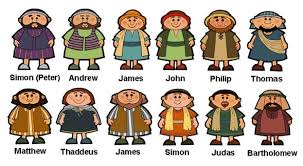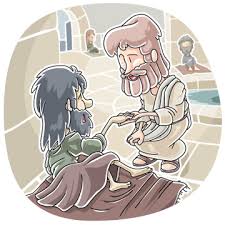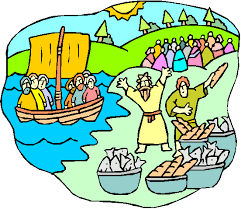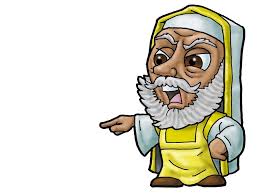John 5:1 – After this there was a feast of the Jews, and Jesus went up to Jerusalem.
In our last post, we studied the second miracle that Jesus did in Galilee – healing the official's son even though he was not present to see or touch the boy.
 Sometime after that, Jesus and his disciples went up to Jerusalem for a feast. John is not specific about which feast it was, and nothing can be gained by vain speculation. Obviously, we don't need to know in order to understand the spiritual principles in this passage, so we won't bother to enumerate the many possibilities that have been given.
Sometime after that, Jesus and his disciples went up to Jerusalem for a feast. John is not specific about which feast it was, and nothing can be gained by vain speculation. Obviously, we don't need to know in order to understand the spiritual principles in this passage, so we won't bother to enumerate the many possibilities that have been given.
In any case, Christ came to Jerusalem partly because the Law commanded it and partly because there would be huge crowds of Jews present, which made this an opportune time to share the gospel. The particular incident mentioned at the beginning of this chapter has important spiritual implications for all of mankind, but particularly the Jews.
John 5:2-3 – Now there is in Jerusalem by the Sheep Gate a pool, in Aramaic called Bethesda, which has five roofed colonnades. In these lay a multitude of invalids – blind, lame, and paralyzed.
As we all know, the city of Jerusalem was surrounded by a wall. Here is a trivia question for you: How many gates did the wall contain? Can you name them? You can find the answer at the end of today's post.
The gate mentioned in this passage is the sheep gate, which is situated in the northern portion of the wall. It was the gate closest to the temple. It is so named because the sheep (and oxen, goats, etc) which were taken into the city for temple sacrifice were led through this gate.
Near to the sheep gate was a 'pool' or a small lake used for bathing and/or swimming. The pool was named Bethesda which means 'House of Mercy'. Around the pool were five porches or colonnades, which afforded shade from the intense sun and shelter from the rain. Large numbers of blind and crippled people gathered under these porches.
Why would they choose to be there?
John 5:4 - ... waiting for the moving of the water, for an angel of the Lord went down at certain seasons into the pool, and stirred the water: whoever stepped in first after the stirring of the water was healed of whatever disease he had.
John 5:4 is missing from some of the earliest biblical manuscripts. Thus, there is some controversy over whether or not it is a genuine part of scripture. Check your own Bible. You may find it recorded in one of the margins of your own copy, rather than between verses three and five.
For the purposes of our study, we are going to consider it a valid portion of scripture, for the following reasons:
- There is no conclusive evidence that it is NOT true.
- Scripture supports both supernatural healing, and the ministry of angels to mankind.
- Springs with medicinal properties still exist today.
- The historian Josephus does not mention the pool of Bethesda in his writings, however, there are also many other important places and events that he does not record.
- The Jews of that day believed God was responsible for these healings; they regarded this as proof of the mercy of God (hence the name).
So what was going on here?
The natural waters of this pool/lake/spring seem to have had some kind of medicinal properties. This in itself is not really supernatural; there are natural springs today which are reputed to have healing properties as well. In this case, the medicinal properties were activated or concentrated when the water was agitated in a certain way.
 The peculiar or supernatural part of the story is that God, in his mercy, would send an angel to periodically stir up the water and facilitate the healing of incurable diseases.
The peculiar or supernatural part of the story is that God, in his mercy, would send an angel to periodically stir up the water and facilitate the healing of incurable diseases.
There is nothing to suggest that the people ever visibly saw the angel. What they were looking for was a bubbling or agitation of the surface of the water. This was the signal that healing was available.
We are told that this occurred at certain seasons. It is likely that those who were in need of healing knew exactly when those seasons were going to occur, so at the approximate time, they would gather under the porticos/porches to wait and watch.
It should be noted that this process provided for the healing of diseases and afflictions that had no known cure. If not for the stirring of the water, these people had no hope of getting better.
It should also be noted that the scripture does not say these people were instantly healed. If indeed it was the medicinal properties of the water that did the healing, it was most likely that the healings occurred gradually over time.
Speaking of time, when did this stirring of the water begin? When did it end?
Nothing can be precisely determined, but there is almost universal agreement that the healings began close to the time of the coming of Christ.
The gift of prophesy and the working of miracles had been withdrawn from the Jews for the last 400 years. These healings awakened and raised hope/expectation within the minds and hearts of the Jewish people that the Messiah was shortly to arrive. The events at the pool caused them to look for other signs of his coming. Perhaps these healings were partly responsible for drawing people to the ministry of John the Baptist.
At the very least, these miracles of healing gave them hope that God still remembered his people. This was of great comfort to them as they lived under the tyranny of the Romans.
As for when the miracles stopped, there is less agreement but many believe they ended with the crucifixion.
John 5:5 – One man was there who had been an invalid for thirty-eight years.
Wow! We are not specifically told what the actual infirmity of this man was, but we do know that it was paralytic in nature – it prevented him from walking. His weakness was considered incurable by physicians.
Back in those days, there were no social programs to assist people as there are today. Since the man's weakness rendered him unable to walk, he was also unable to work. He was a victim of both disease and poverty.
Everyone who came to the pool had probably seen this man and knew of his plight. Thus, this miracle cannot be disputed.
John 5:6 – When Jesus saw him lying there and knew that he had already been there a long time, he said to him, "Do you want to be healed?"
At that moment in time, Bethesda was truly the 'House of Mercy' because the God of all mercy had entered it!
In the midst of this throng of people, Jesus then walks up to this one particular invalid and asks him if he wants to be healed.
At first glance, that seems to be a strange question; who wouldn't want to be healed? But the question actually has several purposes:
- First, it reminds the invalid of his helpless state – without the mercy of God, he has no hope to escape his bonds of disease/affliction.
- Second, it kindles hope and faith in his heart, preparing him to receive his miracle.
- Third, it grabs the attention of everyone else in the portico.
Let's picture the scene. There are dozens and dozens of afflicted people crammed into the porticos intently watching for the water to be stirred. They are not passing the time talking or playing cards or looking at their phones. They have a single unrelenting focus – to be healed by being the first person into the water when it is stirred up.

Now imagine Jesus (speaking loudly enough for all to hear), bringing up the possibility of a complete healing for this invalid without getting into the water. Don't you think it would have caught the attention of literally everyone there? I am sure they turned their attention to Jesus immediately. This put them in the position of being witnesses to the miracle that was about to take place.
In turn, the miracle they witness prepares the people to hear and receive the gospel message that will bring them eternal life.
John 5:7 – The sick man answered him, "Sir, I have no one to put me into the pool when the water is stirred up, and while I am going another steps down before me."
The man's answer implies that he did indeed wish to be healed, but in addition to all of his other problems, he had no friend or relative to help him into the water. Practically speaking, his chances of being the first one in were zero. He was utterly helpless and alone.
This answer reveals a lot about the man. Like the official with the dying son, he limits God. His mind can only see one path to healing – getting into the water first. But God has something much greater in store for him. The goodness and mercy of God extends far beyond the narrow limits of the invalid's faith and imagination. Thankfully, it does in our case too!
What miracle are you looking for? Does it seem as impossible as this man being healed? With God, nothing is impossible. Even when you don't see a way, God has it all under control. Just stay in faith, and don't limit God - he is very likely to do something that surprises you!
John 5:8 – Jesus said to him, "Get up, take up your bed, and walk."
If the invalid possessed the ability to walk around carrying his own bed, there would be no need for healing; no reason to be at the pool. Clearly, this was a command that he could not complete in his own strength.
Thus, we are presented with a spiritual principle that is still true today – God is made perfect in our weakness.
2 Corinthians 12:9 - And he [God] said unto me [Paul], My grace is sufficient for you: for my strength is made perfect in weakness. Most gladly therefore will I rather boast in my weaknesses, that the power of Christ may rest upon me.
What has God called you to do for his kingdom? Are you a witness in your work place? Are you feeding the homeless or ministering to the addicted? Are you taking ground for the kingdom through political office or other places of leadership? Are you starting your own company? Do you ever feel like you don't have the strength to complete the task you were assigned? Well, good - that means you are on the right track!
God never calls us to do things that we could do in our own strength. If he did, we would take all the credit for the accomplishment. But when we give him room to work in the midst of our weakness, the task is completed and he receives the glory for it. When he is glorified, men are drawn to him and they receive salvation.
If you ever find yourself growing weary, stop and remember the example of the invalid at Bethesda: God gave him the strength to do as he commanded. God was glorified in his weakness. God will do the same for me and you!
Here is some further encouragement for you: The man had his heart and mind set on being healed through the water, but in a single instant Jesus did more and greater things for him than the water ever could! So lean into Jesus and let him bring about the victory.
John 5:9 – And at once the man was healed, and he took up his bed and walked. Now that day was the Sabbath.
Remember, the stage has been set to accomplish great spiritual things through this miracle. The man has a long public history of being disabled; his situation is well known in the community. On the day Jesus shows up, the portico is crammed with people waiting for the water to be stirred. Jesus has called attention to the man by asking him if he wants to be healed, then he gives him the command to rise up and walk.
The man's sudden and complete restoration to health is an incontestable miracle! It proves the divinity of Jesus and it shows that God is moving among his people.
But why does Jesus tell him to carry his bed? What purpose does that serve?
 If we take a general look at the miracles of Christ, we find that he frequently connects a miracle with some kind of action which attests to its truth. For example, after the miracle of the loaves and fishes, Jesus instructs the disciples to collect the leftovers, which were more than the actual lunch they started with. This bears witness to the miracle.
If we take a general look at the miracles of Christ, we find that he frequently connects a miracle with some kind of action which attests to its truth. For example, after the miracle of the loaves and fishes, Jesus instructs the disciples to collect the leftovers, which were more than the actual lunch they started with. This bears witness to the miracle.
Another example would be the water turned into wine. After the miracle had been performed, Jesus made the servants take the first cup to the master of the feast, to bear unbiased witness to its goodness and genuineness.
In this instance, the man was told to carry his bed around, to show that his weakness/infirmity was completely vanquished and he was totally healed. Thus, those who were not present at the actual healing event under the portico were still witnesses to the miracle when they saw him carrying the bed. There were probably many more witnesses to him carrying the mat than there were to the actual healing by the water.
This brings up another issue.
The scripture tells us that this miracle occurred on the Sabbath. It was a violation of the Law to carry any burden or perform any work on that day (Jeremiah 17:21-22, Nehemiah 13:15-19). At the time of Christ, violations were punishable by death or scourging.
We can be sure that the timing of this miracle was no accident. Jesus is proving that he is the divine Son of God and therefore, he is Lord of the Sabbath. Because he was the one to give the command to the healed man, it was therefore lawful.
Jesus did many of his miracles on the Sabbath to prove that the Jews misconstrued the Sabbath law. They obeyed the letter of it (do no work) but not the spirit of it. This is proved by the question of Jesus as he healed the man with the withered hand:
Luke 6:9 - Then said Jesus unto them, I will ask you one thing; Is it lawful on the Sabbath days to do good, or to do evil? To save life, or to destroy it?
Over and over Jesus proved to the Jews that he was Lord of the Sabbath.
John 5:10 – So the Jews said to the man who had been healed, "It is the Sabbath, and it is not lawful for you to take up your bed."
The religious leaders of the day certainly had the right to question the actions of this man. Unfortunately, they were not interested finding the truth.
For example, they completely ignore the miracle this man presented. Here was the very man they had seen countless times over the years in a state of paralysis, unable to even walk. No physicians had been able to cure him. They probably watched year after year as he grew weaker and weaker, while slipping into abject poverty.
And now he is walking around, completely healed! At that very moment they were witnessing an undisputed miracle, and they knew it! This should have played a major role in their inquiry. Instead of rushing to instantly condemn his actions, they should have stopped and examined the evidence with an open mind.
Had they done so, they would have been immediately drawn to Christ. This demonstration of his authority and power over disease should have led them to conclude that Jesus was not only the Messiah, he was Lord of the Sabbath too.
John 5:11 – But he answered them, "The man who healed me, that man said to me, 'Take up your bed, and walk.'"
This common man is making more sense than the religious leaders! In his mind, the one who healed him was at the very least a prophet and the healing was performed by divine authority. Therefore, it was lawful for him to obey whatever divine command he was given, even if it contradicted the law or the traditions of the elders. Therefore, he had no misgivings about carrying his bed on the Sabbath, and displaying the miracle of God to the masses.
John 5:12 – They asked him, "Who is the man who said to you, 'Take up your bed and walk'?"
Again, instead of examining this miracle and acknowledging the hand of God in it, the Scribes and Pharisees stubbornly chose to focus solely on what they believe to be a violation of the law. Their envy and anger are aroused against the person who healed this man! Can you believe it? Because of the hardness of their hearts, they are missing the day of their visitation!
John 5:13 – Now the man who had been healed did not know who it was, for Jesus had withdrawn, as there was a crowd in the place.
Immediately after the miracle, Jesus slipped unnoticed into the crowd that was there. By doing so, he avoids a confrontation with the unbelieving religious leaders. He also avoids another danger – becoming the favorite of the fickle crowd, who would probably have wanted to make him a king so he could fight Rome.
For his part, the newly healed invalid is only concerned about the fact that he is now healed; he hasn't yet thought to stop and thank the man he perceives to be a prophet.
John 5:14 – Afterward Jesus found him in the temple and said to him, "See, you are well! Sin no more, that nothing worse may happen to you."
The healed man seems to have gone at once to the temple, which would have been a privilege for him, since he could not go for so many years. It was certainly proper for him to give thanks to God for his cure (although the best thank offering would be to live a holy life).
Jesus finds him at the temple and admonishes him to 'sin no more'. The implication is that the infirmity of this man had its root cause in some prior sin. The command to cease from sin is most likely attached to that one fault; Jesus is not commanding him to be perfect in every aspect of life from that day forward. Rather, the man should repent of that sin/fault and never participate in it again. For example, if it was drunkenness that caused his problem (there is no evidence that this was the case; this is just an example), Jesus is instructing him to repent and never drink again.
Further, Jesus warns him about falling back into sin. This proves that Jesus not only knew the secret past sins of this man's life, but he knows the future too – if the man returns to his former habits, something worse than 38 years of sickness will occur.
John 5:15-16 – The man went away and told the Jews that it was Jesus who had healed him. And this was why the Jews were persecuting Jesus, because he was doing these things on the Sabbath.
The man, still full of joy, went to the religious leaders and told them it was Jesus who had healed him. His motivation was to honor Christ and make him known to his fellow Jews so they too could experience his power and goodness. (Had his motivation been to betray Jesus, he would have told the Jews it was Jesus who directed him to 'take up his bed and walk').
But his innocent intentions backfired. The reaction of the religious leaders is to persecute Jesus – to oppose him, to try and ruin his character, to destroy his popularity, even to slay him.
What is the main cause of their jealousy?
 One, Jesus did not operate within the narrowly defined parameters they had assigned to God. If Jesus had healed this man on a different day, perhaps things would have been different; but healing on the Sabbath was just unacceptable!
One, Jesus did not operate within the narrowly defined parameters they had assigned to God. If Jesus had healed this man on a different day, perhaps things would have been different; but healing on the Sabbath was just unacceptable!
What about us? We must guard against becoming religiously rigid and self righteous like these Jews. What if Holy Spirit moves in your church next Sunday in a way that he has never done before? Will you embrace the mercy and power he shows to people, or will you be angry that the service was 'weird'?
What if God touches someone in the next praise service and they dance, or shout or laugh or loudly weep? Will you be offended and indignant, or are you ready to embrace the move of the Spirit?
We say that we desire God to move in our midst, but we often fail to leave him any room in which to work. Like the Jews, we try to keep Holy Spirit in the narrowly defined parameters that we have set for him. What would happen if we spent some time in prayer before our next church meeting, giving Holy Spirit the freedom to minister without any of our preset limits? What if we didn't follow the clock so closely? Do you think He would show up in a powerful way?
The second cause of the Jews' jealousy was their loss of power and prestige. For many generations the Pharisees and Scribes enjoyed being treated as the 'royalty' of the nation. Whatever they said or decreed as tradition was immediately put into practice. When Jesus came and began to tear down those traditions, he was also tearing down the little kingdom of power and authority they had set up for themselves, and they hated him for it.
In fact, they had so much pride and blind fury that they sought to kill Jesus – nothing but his blood would satisfy their vengeance. Pride is a sin that causes us to sin against others and it always leads to our own downfall (Proverbs 16:18). We need to guard against it at all costs.
Let me offer you some encouragement, relief and some strength:
Did you recognize the paralytic man in this bible passage? If you saw a reflection of yourself in him, you are right on target!
 In the beginning of the paralytic's life, he was healthy and whole. In the beginning of time, God created mankind without sin and placed us into the Garden of Eden.
In the beginning of the paralytic's life, he was healthy and whole. In the beginning of time, God created mankind without sin and placed us into the Garden of Eden.
At some point, the paralytic physically embraced sin and it completely ensnared him. It robbed him of his health, his relationships, his money, his work/ability to accomplish things, his peace, his joy and his right to go into the courts of the temple. Likewise, mankind embraced sin and it spiritually ensnared us. We too were robbed of our health, relationships, money, work, peace and joy. We lost the right to enter into the throne room and presence of God.
No one could help the paralytic; neither could he help himself. There was no cure for his disease. No physician could free him from the bonds of paralysis. In fact, his disease got steadily worse as the years passed. Spiritually speaking, mankind could not help himself overcome or cure the problem of sin. There was no known cure in the world of man; there was no one to break the bondage of sin in our lives.
But then Jesus came into the house, bringing his mercy with him! He asked the paralytic if he wanted to be healed. Likewise, Jesus asks this same question to each and every person. If we want him to, Jesus will spiritually heal us. He will free us from the bondage of Satan and restore us to spiritual health with his blood.
The paralytic did two notable things after his healing: He obeyed the command of Jesus to carry his bed, and he went into the house of God to give Him glory. Once we have been redeemed by Christ, we too should be drawn into obedience. We too should be ecstatic at the opportunity to enter into the presence of God.
In truth, this was the lesson Jesus wanted to convey to the Jewish people. But unfortunately, the religious leaders missed the message entirely. They found themselves on a tangent that further ensnared them; their path did not lead to life.
Is it possible that this has happened to you too? Have you somehow taken a wrong turn and you are not as close to Jesus as you used to be? Is something driving a wedge between you and the Lord? If so, let me offer you some relief.
You can make things right between you and God right now. If you have never had a relationship with him before, you can have one now by praying the following prayer, and meaning it from your heart:
Dear Jesus, I confess to you that I am a sinner. I am sorry for all the wrong things I have done and I ask you to forgive me. I believe that you are the Son of God, that you died on the cross and rose again, and that your blood paid the price for my sin. I invite you to come into my heart and life and to be my Lord and Savior. I commit myself to you right now. Thank you for saving me from death and giving me the gift of eternal life. Amen.
If you have prayed a prayer similar to this in the past, but your love for God has grown cold, you can pray to Jesus right now, asking that your relationship be restored. Just speak to him from your heart and confess your sin; he already knows what has happened and he still loves you.
In either case, begin to walk in obedience to God's commands, and spend time in his presence thanking him for healing your sin problem.
TRIVIA ANSWER:
The wall of Jerusalem contained 10 gates. They are: The Sheep gate, the Inspection gate, the East gate, the Horse gate, the Water gate, the Fountain gate, the Dung gate, the Valley gate, the Old City gate and the Fish gate. You can find all of this information in Nehemiah chapter 3.

